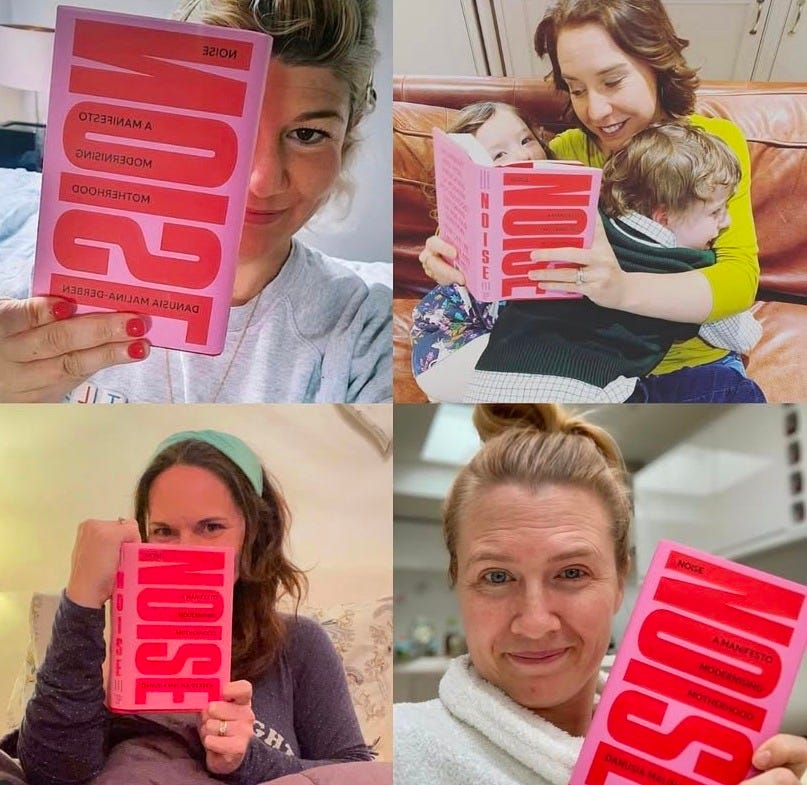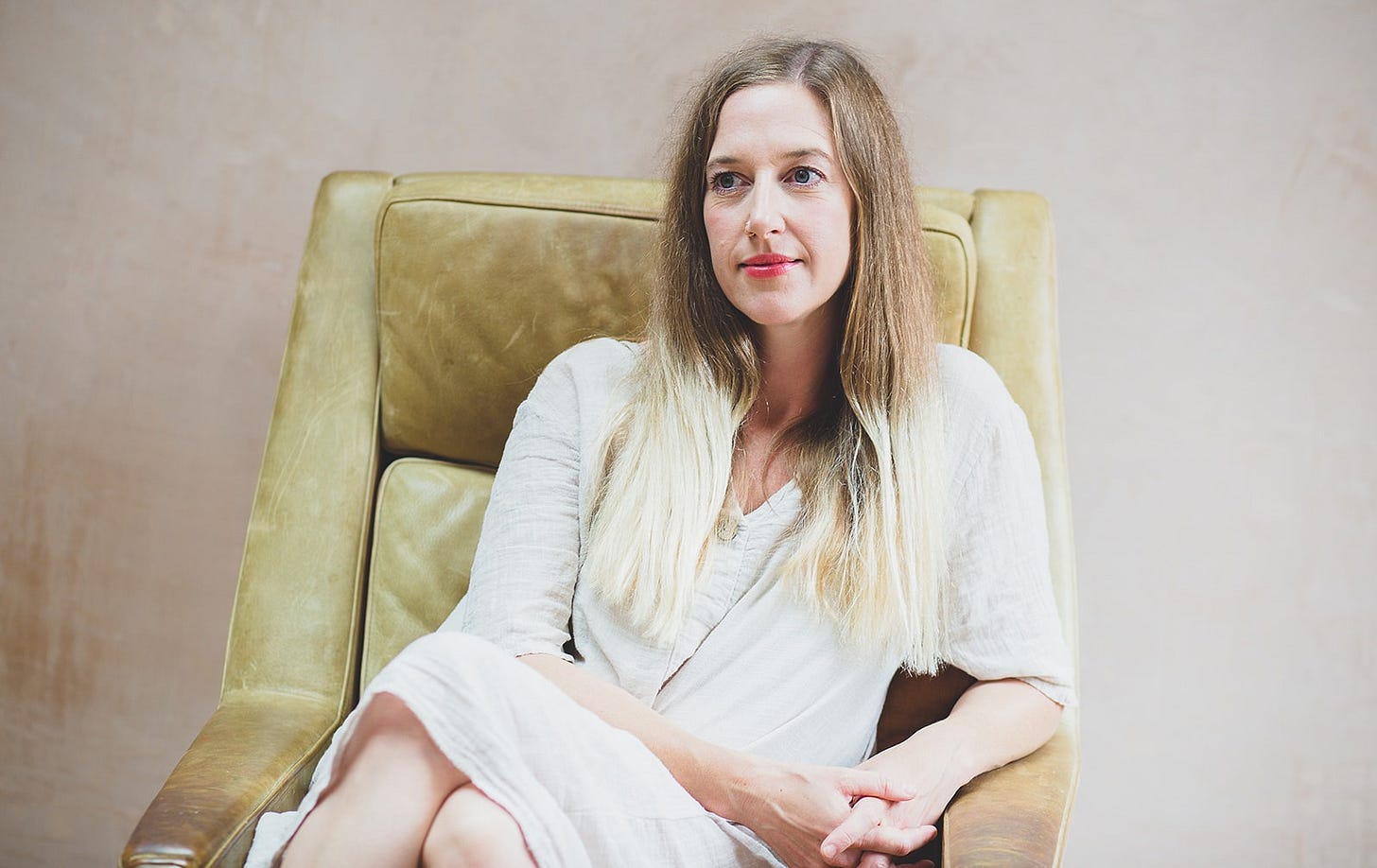Welcome to Parents That Write.
Parent writers, artists, and creators are more than just their ‘chaos’. We’re publishing books, dropping albums, optioning screenplays, and making magic every day.
HOW DO THEY DO IT? That's what we're here to find out. Each week, my guests tackle eight quick-fire questions, plus a few wildcards. But first, a peek into my own creative life:
No-Fluff Notes from my Writing Life
The Anti-Launch: Book Visibility Without the Fanfare
There’s this expectation that when your book comes out, you should make a scene. Book a room. Sling the canapés. Stand in front of a giant “Author” balloon arch and pretend not to mind being looked at.
I didn’t do any of that.
My motherhood book, NOISE: A Manifesto Modernising Motherhood came out during the pandemic, but let’s be honest that wasn’t the reason I skipped the launch.
The truth? I didn’t want to play the game. The one where you orchestrate applause, pretend it’s all effortless, and smile like the event isn’t stressing you out more than crowning in childbirth.
My book is about cutting through the racket surrounding motherhood. Did I really need to add more noise just to get it noticed?
Still, the pressure was real. That weird internalised idea that a book only counts if you shout about it. If you perform visibility. If there’s a hashtag.
But NOISE isn’t loud. It’s deliberate. And instead of fanfare, I chose connection.
What came back wasn’t a tidal wave. It was a soft swell. A slow rhythm of messages from readers. Not viral. Not explosive.
Just: this landed. This made me feel seen.
Women told one another about NOISE. Men bought it for their loved ones. Books sold, and keep selling. That was the launch. No stage required.
We get to do this the way it feels true not the way we were told to.
Next week, I’ll be joined by the brilliant
Today, I bring you my interview with , London-based writer whose work spans journalism, poetry, and spiritual nonfiction. She's the author of The Freelance Mum (2019), Shy (2021), and Raise Your SQ (2023), and her viral poem “I’ve Just Had a Baby” has resonated with mothers worldwide. On Substack, themes she explores include motherhood, creativity, and neurodivergence, offering readers both insight and solidarity.
Share a broad snapshot of your life. Who are you parent to and/or have caring responsibilities for?
I have three kids, a 10-year-old girl and two boys, aged eight and five. We live in north London with my husband (their dad) in a cottagey house that we're currently renovating, with a lovely long garden and lots of birdlife.
Where can we find you?
Website | Instagram | Substack | Newsletter
Can you share favourite praise for your writing?
‘Annie’s soul is so soothing and just encourages us to think of things differently’ – Holly Tucker, MBE
Why do you write?
I have always used writing to communicate. As a child, I'd write notes and letters to my parents to ask for things I wanted and also to tell them when I'd been naughty.
When I was about eight, I wrote a poem about Maltesers and that was the first time I remember being quite proud of something I'd written.
Later, I got into writing stories, diaries, love letters. And in my early 20s, after completing an English degree, I became a journalist.
I write, because it's how I process the world and share my learnings with others. Through poetry, a rhythmic passage, letters, quotes, online courses, articles, essays, books.
What does the inside of your writing mind look like?
I feel music in my body. I play the piano, guitar and hang drum, and I sing and make music. So, the rhythm of my writing starts in my body, not my mind. And that is where it all begins.
But when it becomes clear that this rhythm is actually an idea I need to convey, my mind is a vast (empty) expanse and the words appear like individual floating lines.
I piece them together, one by one, and repeat them over and over before committing them to paper (or the Notes app in my phone).
Sometimes, it feels like the line that has appeared is running off, or floating away, and I have to tug it back in. Sometimes, I let it go. Sometimes, I regret having done that.
How is your ability to write affected by being a parent and your ability to parent affected by your writing?
Motherhood and writing have both been a calling since childhood. I always knew I would do both. And the intensity of the love I feel for my children definitely made me a better poet.
I never stopped writing, after having babies.
I would lie on the sofa with my firstborn, my daughter, as she breastfed, hungrily tapping words into my phone. I needed to explain this incredible experience, in words.
However, I hadn't anticipated that it would infiltrate every aspect of my writing.
When I was pregnant, I was interviewed on a radio show and the host asked if I would now be writing articles about motherhood.
I scoffed, and said that my journalism would continue to focus on feminism and feminist issues, and that my motherhood would be separate.
That quickly changed. All I wanted to write about was motherhood. Motherhood poems, articles about my life, as a mother. A book about freelancing around young kids.
(And, of course, motherhood is in itself a feminist issue, or at least a very interesting experience to explore through a feminism lens.)
I suppose writing about everything has helped me to reflect and process, as I go, and I hope that feeds back positively into motherhood. You'll have to ask my kids, when they're older.
My children are quite used to me going blank, while they are speaking, and pulling out a phone or notebook to write down an idea. They land at inconvenient times, sometimes.
Likewise, they often stop listening to me or decide that something else matters more than our conversation and really, that is life. We can't have anyone's full attention at all times.
How often do you write with your child around or not, and what kind of writing do you get done when your child is nearby?
I get up around 5.30/5.45am and often have time to write an essay for Substack, or part of whatever book I'm working on, but when a child comes in, I shut the laptop.
However, if I'm around my children and an idea for a poem drops in, I will usually go to the toilet and do a '20-minute wee' so that I can finish it.
So, if it's short-form, I might scuttle off to get it noted down. But longer-form requires a different type of concentration and I can't do it if my children are asking questions.
What is your best writing habit?
Dictating ideas into the Notes app on my phone. And, increasingly, using Siri (or some version of AI) to note down ideas while I drive or walk. I love capturing every idea.
Then, I return to the ideas and turn them into something.
I love technology. I'm a busy working mum, and it helps me to be organised and efficient.
But I also love a notebook and I always have about five on the go. I leave them everywhere and when I'm around the kids, I try to note down ideas rather than pulling out my phone.
So, technology for catching ideas when I'm on the go, and a notebook for when I'm still. I also have to do all my planning in a notebook, so that I can add arrows and circle things.
What are the three most important characteristics of being a writer who is a parent?
➡️ Allowing yourself to ignore your children (when safe) if an idea lands. Otherwise, resentment can build.
➡️ Carving out time for your writing in the same way that you carve out (loads) of time for your children. Both matter.
➡️ Be considerate about the ways you write about your children, if you do. I try to think ahead and to work out if they'd mind that idea/theme floating on the internet when they're older.
What or who is your secret writing weapon?
Stepping away if I feel stuck - making a cup of tea, getting some water, going in the garden. I did that when trying to think of an answer to this question.
What or who has been the most significant creative influence in your life?
Possibly the Beat Poets. I like the rhythm and simplicity of their writing. Also, that it's often about the everyday. I love finding meaning in the seemingly mundane.
What unfinished writing projects do you have lying about?
Three novels. The first two are finished but not good enough. So, not really finished.
The second one actually has two full drafts that are completely different - same characters, same themes, but written from scratch the twice, when my second child was a small baby.
I used to write fiction in the evenings, when my two children were in bed. They had a strict 7pm bedtime and so it worked. But my third child co-slept (and still does), so I can't do that any more. Also, I don't have the energy in the evenings.
That said, I spent last summer writing once the kids were in bed.
I wrote between 9pm and 11pm. I could muster the motivation and focus, but I usually go to bed at 9pm so it started to have a knock-on effect. Especially as I like waking up early.
The third novel is 10,000 words long, so far, and it's the best of the three but I don't have the time - or inclination - to go back to it just yet.
I'm allowing it to percolate and maybe, in time, I'll return to it.
What is the favourite sentence you’ve ever written, and why?
I was walking home after dropping my kids at school one day and this line came into my head 'I want to have kids and to be with the kids all the time and I want to be alone so that I can write' - and that became a poetic passage that I shared on Instagram.
I wrote it in five minutes and barely edited it, and it went massively viral, in a matter of minutes. So, I think that's probably my favourite line, because of the way it resonated so deeply with many other women around the world. I felt connected to each of them.
Here's the whole passage
What are your favourite/preferred writing conditions in terms of clothes, environment, food you eat and anything else that helps you write?
I have a capsule wardrobe. Everything is beige, cream and black. This means I can get dressed really quickly in the morning and steal an extra 20 minutes for tapping a poem into my phone, while my kids are getting ready for school.
I drink a lot of water when I'm writing and I often don't eat for hours, because I'm concentrating. I find hunger quite frustrating when I'm in hyper-focus, and sometimes I don't eat anything until 1pm (I don't recommend this, I'm shaking by this point).
I need a relatively quiet spot to work, though right now there's a drill going off nearby and I don't mind that. But if I'm writing a longer piece, I can't have people walking in. I don't want to see anyone or hear any questions or comments
Closing out this Column with:
“Writing, regardless of the end result, whether good or bad, published or not, well reviewed or slammed, means celebrating beauty in an often ugly world.” -- Mary Karr
PARENTS WHO THINK (AND CREATE) TO THE COMMENTS 👇🏻
Annie writes about the tension between being with her kids and needing solitude to write. About words that arrive inconveniently. About letting poems interrupt her life and learning not to apologise for that.
When do your ideas tend to arrive? Do you chase them? Write them down? Let them go? No perfect answers needed, just come as you are.
If you’re reading this via email you can just hit reply and send me a message 💎














Thank you for having me, I loved this interview x